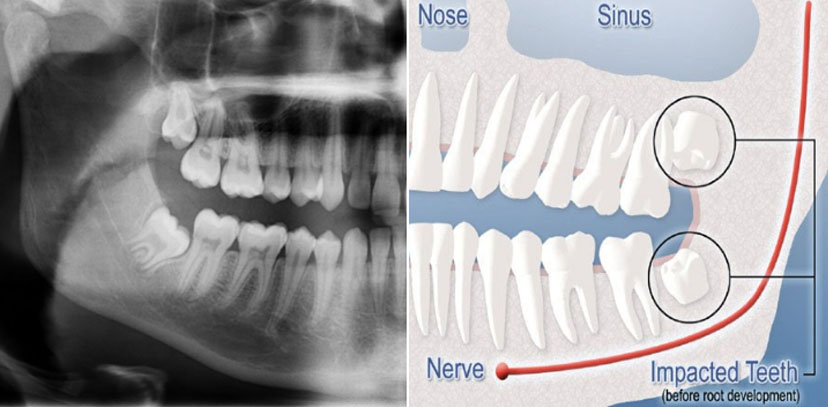
Wisdom teeth are the third molars, located at the very back of your mouth. Most people have four wisdom teeth – one in each corner of the upper and lower jaw. They sometimes emerge between the ages of 17 and 25, but often become impacted and do not come into the mouth. These teeth were useful for our ancestors who needed extra molars for chewing tough foods, but in modern times, they often cause more harm than good due to the lack of space in the jaw.
16 years old is the perfect age for removing wisdom teeth.

One of our wisdom teeth patients.
Wisdom teeth should be removed if they are impacted, causing pain, or leading to dental issues such as crowding, infections, or cavities. These third molars often lack the space to grow properly, which can result in swelling, discomfort, and difficulty cleaning the area. We recommend removal in the mid to late teens, as younger patients tend to heal faster and experience fewer complications. If wisdom teeth are left untreated, they may cause infections, which can be life threatening, caries (cavities), misalignment of adjacent teeth, gum disease, or cysts that can damage the jawbone. A dental evaluation with x-rays can determine if removal is necessary to maintain long-term oral health.
When teeth are physically prevented from erupting, they are considered to be impacted. Impacted teeth cannot erupt into the proper position for chewing and cleaning. Impaction occurs when the tooth is positioned against another tooth, bone, or soft tissue, and prevents the tooth from fully erupting from the gums into a healthy position. This is a common problem affecting 75% of the population and can lead to other issues if the tooth remains untreated.
There are four common classifications of impactions – soft tissue, partial bony, complete bony, and complete bony impacted difficult.

Panoramic view of the jaw showing wisdom teeth and other anatomical details.
We have detailed post-operative instructions available here.
If you are experiencing discomfort or have concerns about your wisdom teeth, schedule a consultation with our wisdom teeth experts today. Early evaluation can help prevent complications and ensure optimal oral health.
Schedule NowServing the Following Cities
Loveland, Fort Collins, Greeley, Evans, Berthoud, Windsor, Timnath, Johnstown, Milliken, Severance, Ault, Wellington, Estes Park, Longmont, Mead, Firestone, Fort Morgan, Sterling, Cheyenne, Laramie